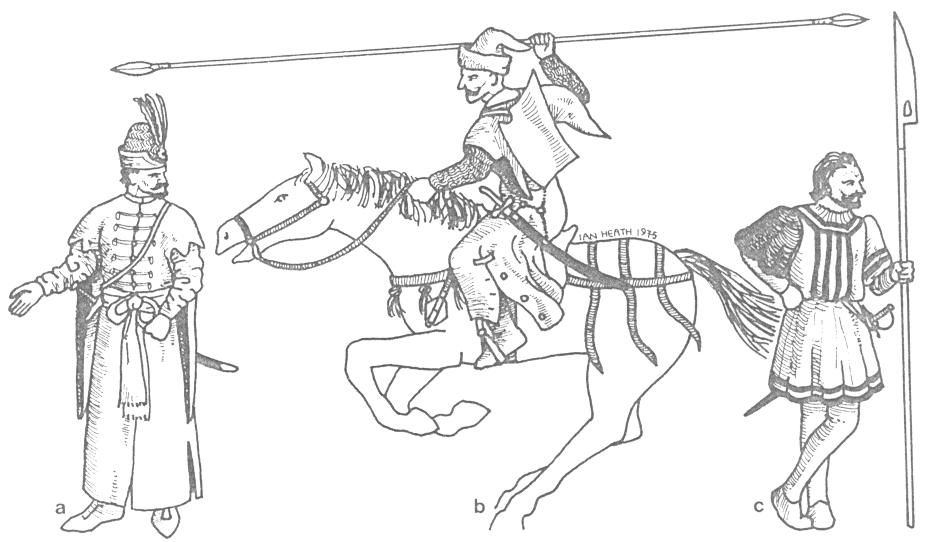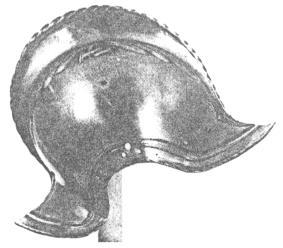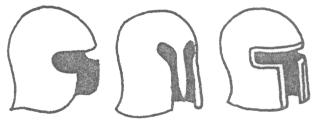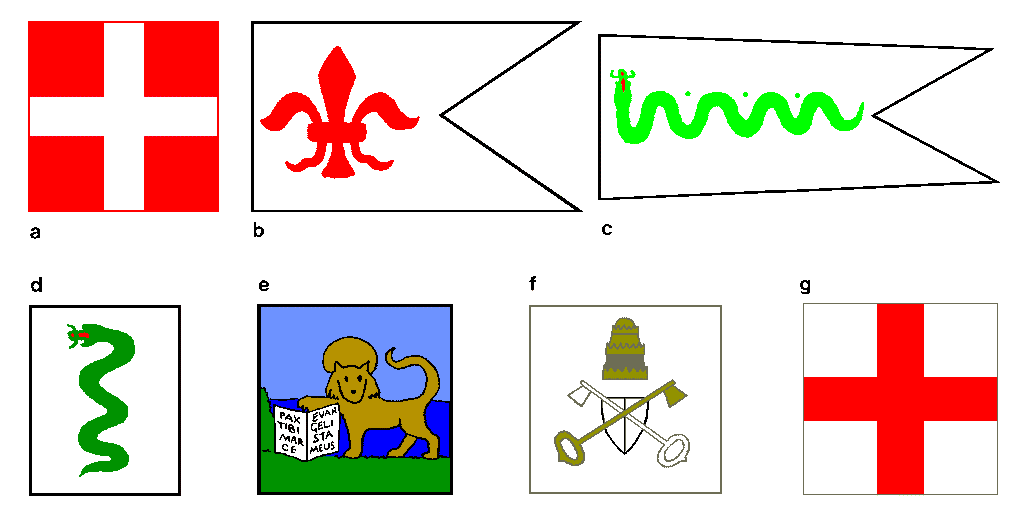
Try Amazon Audible Plus

None the less, more recent writers (notably Michael Mallet in Mercenaries and Their Masters) have gone some way to modify this picture, particularly in showing that the Italian states were not as totally dependent on the Condottieri as has been supposed, and that they did not entirely abandon citizen-soldiers, nor neglect infantry. Nor were the Condottieri quite such disinterested professionals as they might appear, since they were often bound, by land grants and so forth, to the permanent service of a particular state.
Their bands were largely of cavalry, and their prime soldier was the relatively invulnerable man-at-arms or gendarme. Italian gendarmes were well-armoured and equipped, with lances longer but perhaps more fragile than those of the French, an axe being the favourite secondary weapon. They were well-mounted too, the Italians having pioneered the scientific breeding of war-horses, and man for man were to prove a match for the French, though much less effective when in formed bodies. As in other armies, they were counted in 'lances', including the man-at-arms, a 'sergeant' or more lightly equipped cavalryman, and a page. In the later 15th Century there could be as many as four, or in Papal service five, men in a lance, but it is likely that there would still only be two combatants.
A Condottiere's company would be divided into several 50 or 100 lance squadrons, the largest being his own 'casa' or household, which included trumpeters and attendants as well as the best gendarmes, and perhaps young noblemen from the city he served. In battle, however, smaller squadrons of about 25 lances were employed; the condottiere would commit only one or two to battle at a time, replacing them with others as they became tired. In the late 15th Century, eight or ten of these small squadrons could be brigaded together as a 'Colonello'.
There were also cavalry directly maintained by the cities; these could include some kind of bodyguard force like the 2,000 strong 'Famiglia' of Milan, but the greater part would be directly-hired 'Lanze Spezzate' (broken lances). By the 1480s, two-thirds of the cavalry of Milan were of these types rather than condottieri-controlled.
Apart from lighter cavalry included in the gendarme 'lances', separate bodies of light horse began to appear during the 15th Century. These were initially mounted crossbowmen, but before 1500 Camillo Vitelli had begun to employ mounted arquebusiers. By the 1480s the Venetians had introduced 'Stradiots', of whom they had six squadrons. These were irregular Balkan cavalry, originally survivors of Scanderbeg's struggle with the Turks in Albania, but later recruited from Greeks and Croats as well. They dressed in Turkish style and rode Turkish horses, but instead of turbans wore caps or helmets; for protection they at first had mail and Turkish style shields, later relying on helmet and breastplate. Their most characteristic weapon was a short throwing and thrusting spear with points at both ends called an 'assagaye' (assegai), and they also favoured mace and curved sword; some had crossbows or light lances. Though renowned for ferocity, they were undisciplined and tended to disappear in the direction of the enemy camp or baggage train early in any action, though they were useful for raids and ambuscades.
Condottieri bands could include infantry, and much larger numbers were directly hired by the cities. In Milan and Venice at least, these were supplemented by citizen militia, officered and trained by professional 'constables'. Nor were infantry confined to garrison duties, since they made up about half the strength of most Italian states' field armies in the late 15th Century. Most of these infantry were missile men, armed with early handguns or later with arquebusses, or with crossbows - in 1482 the Milanese had 1,250 handgunners, 352 arquebusiers and 233 crossbowmen. They were organised in small companies of around 50, which did not mass together in battle but operated in skirmishing fashion, making maximum use of natural cover. Perhaps surprisingly, many wore helmets and corselets.
The arrival of the Swiss in 1494 indicated the possibilities of massed shock infantry; the condottiere Vitellozzo Vitelli was the first to train Italian pikemen using Swiss tactics, and there were attempts to do the same in the early 16th Century. Venice, firstly, had armies particularly strong in infantry, and at Agnadello, 1509, where they had over 20,000 infantry to only 2,000 gendarmes and 3,000 Italian light horse and stradiots, they employed several thousand Romagnol mercenaries with the pike, dressed in red slashed with white, to support their militia who were probably mainly arquebusiers.
Secondly, Florence attempted to turn to a revived citizen militia for defence (an experiment which much affected Machiavelli’s views). In 1506 they had 10,000 infantry, trained by professional officers, and composed of 70 per cent pikemen, ten per cent arquebusiers and 20 per cent halberdiers, crossbowmen and sword and buckler men. (They later planned to raise 500 light cavalry, ten per cent lancers, the rest crossbowmen). In their final bid for independence (1528-30) the Florentines tried to get as many arquebusiers as possible, and of 3,000 City infantry raised, 1,700 were arquebusiers, 300 halberdiers, and 1,000 pikemen; only 60 had th4 new muskets. The 10,000 country militia may have been differently armed.
The ill success of such ventures (the Venetian pikes were slaughtered at Agnadello and the Florentines failed) may have discouraged the further development of Italian pike infantry. The Italian states' troops were usually fighting as part of alliances (such as the Holy League against France) where Lansknechts or other foreigners could provide the solid infantry base, or else Italian soldiers were being hired for other people's armies - invariably being called on for their national specialities of skirmishing with arquebus or musket on foot, or mounted with crossbow or arquebus (though Italian men-at-arms were also used).
The most famous of these mercenaries, and indeed one of the elite forces of the later Italian wars, was the 'Bande Nere' (Black Band) of Giovanni de Medici. Typically, this consisted of about 300 mounted and 3,000 foot arquebusiers (some of the latter may have been provided with poor mounts to turn them into an early species of dragoon or mounted infantryman). Few if any had pikes. (The name is often said to have been derived from black mourning bands or sashes worn by these mercenaries after the death of Pope Leo X, but this sounds a little like a rationalisation for a name which was very widely used of mercenary groups at this time.)
The only independent Italian army to survive into the 1530s was that of Venice, though in the 1550s Emmanuel Philibert of Savoy raised a well-organised force of infantry, about 113 pikemen and 213 arquebusiers, in 'centuries', 400 man companies, and six company 'Colonellas'. The great majority of Italian troops later in our period would, however, be serving, often with distinction, in other armies, especially those of Spain and the Empire.
An interesting feature of the medieval armies of the Italian states, which survived through the 15th Century, the Carroccio was a very large flat wagon, brilliantly painted, draped in scarlet, and bearing an altar and a mast (which could have a cross-spar like that of a ship) from which hung the civic banners and other decorations. Drawn on the battlefield by a team of white oxen, the Carroccio would have a picked guard for its defence, and acted as centre, rallying-point, and mobile headquarters for the giving of trumpet signals and the like.
Most of the Italian cities used guns, but this was certainly an area in which they suddenly found themselves outdated in 1494. The guns were heavy, still used only stone shot and, being drawn by oxen, seldom reached the battlefield in time. Even when they did, they were fit only for a single ineffective volley before combat was joined.

a Mid-16th Century Stradiot. Note hanging sleeves and ruffed-up undersleeves. Hat is of a 'beehive' type, of fur or rawhide, which seems to have been common in the Balkans. In this case it has a turned-up brim and a jewelled clasp holding the plume. b An early 16th Century Stradiot wearing a mail shirt, largely covered by a robe with skirt split at the sides, and hanging sleeves. He carries a Turkish-type shield on his back, and carries a sabre, mace and 'assagaye'. c German of the Pope's Guard (Clement VII, 1530). This figure, together with the Swiss figures wearing Sajones shown in the previous chapter, probably give a good indication of Italian infantry costume in the Italian Wars period.
 Italian 16th Century burgonet (Tower of London). |
 'Barbutes' - helmets of semi-classical pattern popular with 15th and early 16th Century Italian cavalry and infantry. They were particularly characteristic of the Venetian army. |
Venice, Austria, And The Turks In The Seventeenth Century by Kenneth M. Setton |

Italian flags. a Verona - red with white cross. b Florentine flag - white with red lily: the city badge. c and d Used at times by Milan. Both show the Visconti family badge of a green serpent swallowing a man. Flags white. e Venetian flag. Blue sea and sky, green grass, gold lion of St Mark and halo. Book white. The Venetians also used white and other coloured flags with the gold lion. f Papal flag, about 1548. White (or red) with triple crown in gold, crossed keys of St Peter in gold and silver.
g The city badge of Milan - white with red cross.